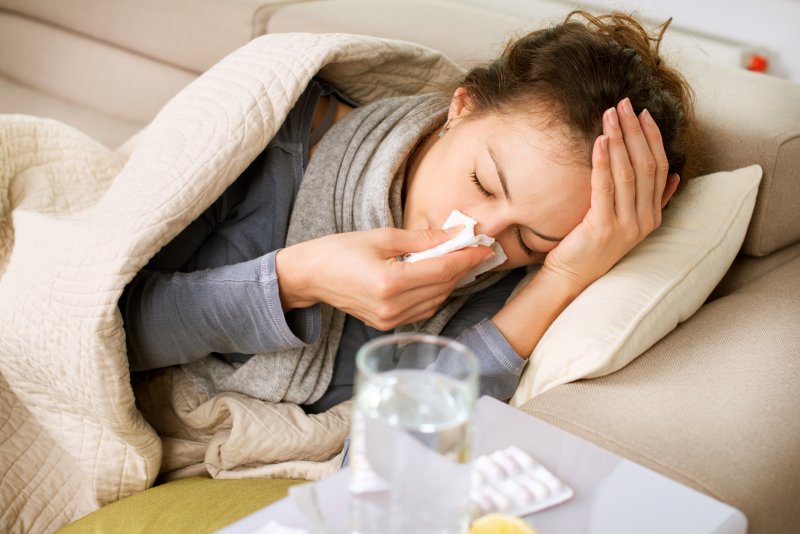
If you find yourself dealing with cold or flu symptoms, your priority is to feel better. Thus, you’re likely to seek out the best products to get the job done. Have you ever considered what impact they can have on your teeth and gums? If not, continue reading to learn the possible dangers some of the common remedies can pose and to get the expert flu season tips you need. Additionally, you’ll learn how maintaining regular visits to your dentist can also be beneficial.
The Problem with Decongestants
When you have a runny nose, you obviously want a product that will slow down the drainage. A decongestant can help, but it comes at a price: the slow down of your natural saliva production.
To get around this, just be sure to increase your water intake. Not only will this help to flush away oral bacteria, but staying hydrated is also better for your total wellness.
The Side Effects of Cough Drops
During cold and flu season, you’re bound to see a bag of cough drops on at least a few of your co-workers’ desks. That’s because they are known for soothing a sore throat. The problem is that, along with their positive qualities, many brands contain high amounts of sugar to make the tablets tastier.
Because it’s never a good idea to bathe your teeth in sugar, it’s better to look for a brand that is sugar-free. Therefore, you won’t have to compromise your oral health just to calm any cold or flu symptoms.
The Downside of Cough Syrup
During cold and flu season, cough syrups fly off the shelves, as people scramble for relief. The thick liquid can pose some problems for your teeth and gums, though. That’s because it’s usually laden with sugar. Thus, a typical dosage can leave a sticky film on your teeth.
An alternative is to take the medication in the form of a gel cap. If you still prefer to use a traditional cough syrup, then it’s best to do so before eating a meal. The increased saliva production will help to bathe your mouth and prevent the syrup from clinging to your teeth and gums.
The Challenges Posed by Drinking Hot Tea
Drinking hot tea is commonly used to accompany any medication because of its relaxing effects. It can also help with calming an upset stomach and soothing a sore throat. The downside, however, is that if you use sugar or honey as a sweetener, it can contribute to cavity development. A simple solution is to use a sugar-free sweetener.
In addition to following the above guidelines, you should also replace your toothbrush to prevent any reinfection. Then, be sure to brush and floss at least two times a day to stop the growth of any new oral bacteria.
Finally, you should be sure to visit your dentist semi-annually for cleanings and examinations. Not only does this help to maintain healthy teeth and gums, but it’s also a great way to fortify your total wellness.
About the Author
Dr. Amy E. Farrell is a graduate of the University of Maryland Dental School. Throughout her career, she has provided top-notch care to her patients in a calm and compassionate manner. Dr. Farrell offers preventive care at NeoSmile Dental Care, and she can be reached for more information through her website.


